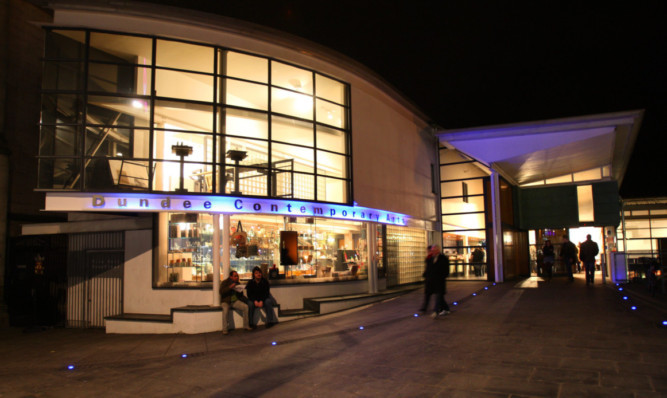A 16% spike from the silver screen helped Dundee Contemporary Arts boost its income despite tough times during the last financial year, newly published accounts have shown.
The Nethergate cultural institution’s accounts and trustees’ report showed grant and trade income reached £1.698 million in the year to the end of March, with the board welcoming a “modest” increase on the previous 12 months.
Sales from the venue’s gift shop rose marginally, while overall cinema revenues increased by around £90,000 to £624,372.
Gallery and education income fell, and the commercial performance of the print studio also dropped back.
The trustees who include a string of city councillors, academics and artists were pleased with the performance.
“Given the general economic conditions the trustees are satisfied with this increase, and in particular highlight the increase of cinema income,” their report said.
“Work continues in ensuring the organisation is doing all it can to deliver excellent value to audiences and artists, and it is leading on partnerships both nationally and locally to ensure every opportunity to achieve this is explored.”
The centre, a charity, remains a “major factor” in the local economy the report adds, directly sustaining 71 full-time-equivalent posts and providing work opportunities for 22 seasonal artists.
It welcomed 300,000 visitors during the year, and received public funding totalling £864,000 from Creative Scotland and Dundee City Council.
Chief executive Clive Gillman said: “It has been pretty important to us to focus on our own ability to generate income.”
He added: “We took the decision, probably about four or five years ago, because we knew a lot of core grant funding was likely to remain at a standstill for a few years.
“South of the border particularly there have been some terrible things going on in how cultural funding has gone. So we make sure we balance the programme, which is what we are here to deliver, with our ability to maximise income around that.”
He agreed that the growth of DCA’s cinema programme had been a key strength, and said the venue was committed to drawing audiences by showing the best films, mainstream or more obscure.
“We decided that what was going to work best for Dundee was if we went for an uncompromising programme,” he said.
“What we like to do is to show what we think is the best cinema, whatever it is and wherever it comes from. People might not have heard of the film that they are coming to see, but they can trust us that it is very good.”
Income included a six-figure franchise fee paid by the operator of the venue’s cafe-bar, a feature Mr Gillman described as “like the living room of the city”.
But the trustees’ report also recognises that a “significant” proportion of income comes from public sources, on which the pressure is “always great”.
They add that DCA needs to “compete” to ensure its aims, ambitions and achievements are recognised and shared by partners “at least at levels that support appropriate levels of growth”.
Mr Gillman looked forward to the centre continuing to be part of the city’s cultural revolution. “The sense of direction of travel in the city, of investing in itself through culture, is really important,” he said. “What’s happening is we’re looking at ways in which we can make that sustainable.”
A £60,000 surplus will be reinvested in the venue.
business@thecourier.co.uk
